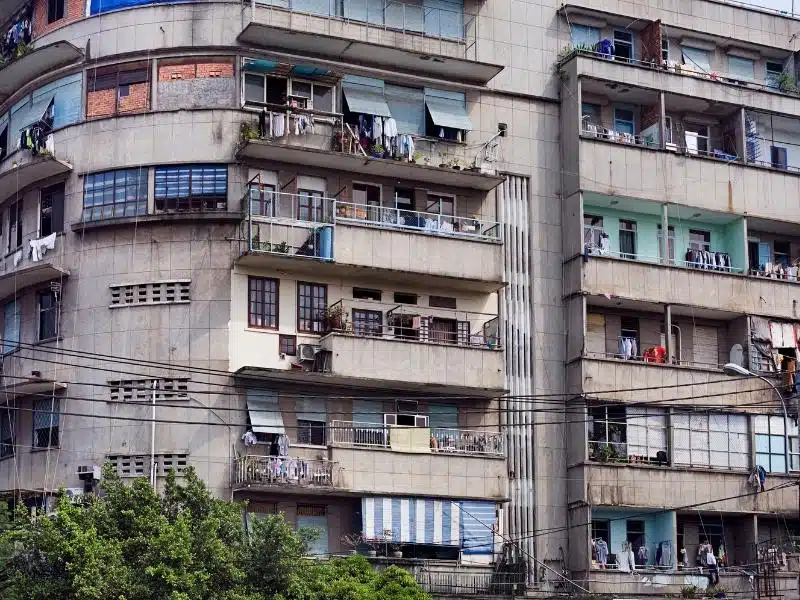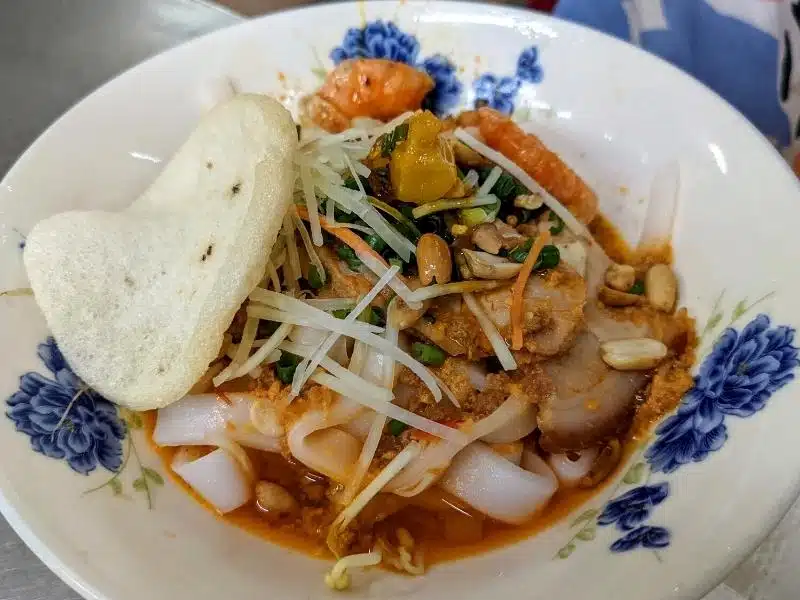Before I purchased my very affordable flight and entered Vietnam, I considered the important question: what is the cost of living in Vietnam? Many travellers and expats in Vietnam assured me that Vietnam is very cheap – surely this is one of the top reasons to move to Vietnam. However, after I actually moved to Vietnam, I realized that Vietnam CAN BE very cheap, but not quite as cheap as I expected.
Vietnam’s cost of living may seem very cheap or not so cheap depending on where you’re coming from (I happen to have lived in a country that’s even cheaper before). For North Americans or Europeans, you may find it crazy cheap, and it is even slightly cheaper than some other Southeast Asian countries. If working in the country, you should definitely make enough to send money out of Vietnam!
The cost of living in Vietnam depends on which city you want to live in. It also depends on what lifestyle you are planning to have.
Below I’ll give you a breakdown of the costs if living in Vietnam, from initial costs of moving to accommodation, utilities, food, transportation, and entertainment.
The Short Answer
| My Cost of Living in Vietnam per Month = $525 | |
|---|---|
| Rent + Utilities | $300 |
| Transportation (renting a motorbike plus gas) | $50 |
| Groceries | $50 |
| Eating out and drinking | $100 |
| Mobile phone bill | $5 |
| Gym membership | $20 |
Numbeo lists Vietnam as the 88th in the world in terms of cost of living, similar to Mexico or Poland. To put things in perspective, the average income for local Vietnamese is only $300 per month.
If you are looking to live a low-budget lifestyle, you can easily get by on US$500 per month, or even lower if you are extra frugal. Since this is what I did, I’ve detailed my monthly expenses in the above table. But please note that I lived in a smaller city, not Ho Chi Minh City or Saigon, which can be pricier.
If you stay in a slightly better accommodation, go out more, or live in the big city, this figure can easily go up to around $1000 or more. At the luxury end, if you live in a fancy villa with a private pool and only dine at the finest establishments, you could spend upwards of $4000 per month.
Factors Affecting Cost of Living

The actual cost of living in Vietnam is of course going to vary quite a bit depending on the lifestyle choices you make. Consider the following:
- Ho Chi Minh City may be the largest and have the most things to do, but it is the country’s most expensive city. The average apartment in the city center costs around $500-700 per month. If you want something a little bigger or nicer, expect to pay closer to $1000. See our detailed guide to the cost of living in Ho Chi Minh City.
- The same goes for Hanoi, but people report that, on average, Hanoi is around 10-15% cheaper than Ho Chi Minh City.
- Are you willing to live in a small studio apartment or share a room with others? Or do you want to live in a fancy villa or apartment with sea view and swimming pool?
- Are you going to be buying groceries or eating cheap food on the streets every day, like locals do, or will you sometimes dine at fancier or Western places?
- Do you plan to travel around and/or party every weekend?
- Will you need to buy a motorbike, take lots of taxis, or just walk to work every day?
Initial Budget for Moving to Vietnam

Before you even start figuring out your anticipated average monthly cost in Vietnam, you need to set aside some money to cover the costs of actually moving there and getting set up in your first month. You can read our more detailed recommended budget for moving to Vietnam and what to pack for moving to Vietnam.
To summarize it here, some initial costs you need to consider are:
- The cost of your flight.
- Visa for entering Vietnam: this could be around US$25 (for Americas) to as much as $200 for certain nationalities. You can see the prices and apply for a Vietnam visa here. Also see our guide to the visa types in Vietnam.
- The cost of your first month of accommodation plus a 1-2 month deposit. For example, if you stay in an apartment that costs $400 per month, you will need to pay $800-1200 right off the bat. You may or may not get your deposit back at the end (see more on that below).
- Enough money to live on until you get your first pay check, that is, if you are planning on working or teaching in Vietnam. Since it could take 1-2 months until you get your first pay check, you may want to have an extra $1000 or so to get by until then.
- Do you play to rent a motorbike? If yes, you can expect to pay around $200 deposit plus the first month’s rental fee ($40) and gas ($10).
- Do you want to buy travel insurance for your trip? If yes, then we recommend Insubuy.
Add up all those things, and you are looking at a budget of around $2000 to 3000+ to move to and get set up in Vietnam, PLUS the cost of your flight.
Thinking of teaching English in Vietnam? We recommend taking this online TEFL course before you go!
Cost of Accommodation and Utilities

The single largest expense in your monthly cost of living in Vietnam is probably going to be your apartment, so this is a good place to start when making your calculations.
Make sure to see our related guide to finding an apartment or house in Vietnam to help you with this process.
Cost of Apartment
The rental cost in Vietnam call fall anywhere between $200-$1000+ per month, depending on the type of accommodation, location, and size.
On the budget end, for example, a studio, mini loft studio, or shared apartment in Dalat or Mui Ne costs about 3,500,000 to 4,500,000 VND ($150 to $200) but in Ho Chi Minh or Hanoi, that same kind of housing could cost 5,000,000 to 7,000,000 VND ($250 to $350).
Make that a slightly larger apartment in an affluent neighborhood in Ho Chi Minh, and the cost will easily climb to 2 or 3 times higher ($500 to $1000).
Deposit and Length of Contract
As I mentioned above, it is normal for landlords to take a deposit equivalent to 1 or 2 months of rent right at the beginning, on top of the first month’s rent. The amount will of course depend on how much the apartment’s monthly rental rate is.
The minimum length of contract for renting most apartments is 6 months, while is it very normal that a landlord may ask you to sign a year-long contract. If you can find someone to take over your place before your contract expires and there are no major problems with the apartment, you can get your deposit back.
However, there are many expats who never get their deposit back regardless of finishing the contract – the landlords often find some kind of way to not give it back. To avoid this situation, I recommend that you find a place that is managed by a respectable real estate company or agent (best done through personal recommendations). Otherwise, try to find a place that only requires a one-month deposit, so it won’t be such a big loss if you don’t get it back.
Electricity Prices in Vietnam
The electricity cost in Vietnam is about 3,000-4,500 VND per KW. If your landlord is charging you more than this, something is definitely not right.
To give you an idea of how much electricity might run you:
In a studio apartment in Ho Chi Minh City (about 40 sqm), you can keep the AC on nearly all day and use your own laundry machine at home. This could cost you about 1,200,000 VND ($50) per month.
On the other hand, in Dalat, in my two-bedroom apartment for two people, with an electric stovetop, big fridge, hot water machine (to turn on about 15-minutes before you jump in the shower then off), and two computers/laptops running nearly all day, but not using AC as much because it is cooler here – the electricity costs about 600,000 VND ($30) per month. In some smaller cities, the cost of electricity may even be included in your rental cost.
The electricity prices go up depending on the seasons, too. For example during TET (Lunar New Year), the prices are higher. Still, as you can see from these numbers, the cost of electricity is negligible when considering the overall cost of living in Vietnam, and is probably lower than where you live.
Mobile Service and Internet
SIM cards are very cheap in Vietnam. For just $5, you can buy a sim card with 2 GB of mobile data, then you can top up the credits for as low as 3,000 VND. Every month, you can purchase 28 GB of mobile data for $6 (120,000 CND). For more info, read our guide to how to get a Vietnam SIM card.
Internet is often included in the apartment rental fee. Almost all apartments and housing in Vietnam have this installed and ready to go when you move in. The costs of internet service here are quite cheap, to the point that when the apartment or house is vacant, owners often don’t even bother having it removed or turned off.
PRICES OF FOOD IN VIETNAM

One amazing thing about Vietnam is that the eating out can be practically as cheap and buying groceries yourself and cooking at home. This of course means you’ll need to eat mainly street food or at small hole-in-the-wall restaurants, like where most locals eat.
If you want more luxurious or international food in the big cities (groceries or restaurants), of course you’re going to have to pay quite a bit more for it.
To learn more about local food, see our guide to the most common Vietnamese foods.
Cooking at Home
If you cook for yourself, you can spend as little as $1 or 2 on a meal. Generally speaking, cooking meals without meat is always cheaper.
Buying your groceries at the local dry and/or wet market is always cheaper than shopping in chain supermarkets. There may be a bit of a learning curve in terms of what’s what and how to cook using local ingredients, but there’s no better way to learn about the local culture than eating like them.
If you want Western items or need specific ingredients for preparing a dish you miss from home, you may be able to find them at specialty grocery stores in Hanoi or Ho Chi Minh City, but it will most definitely cost you more.
Eating Out
Because eating out at street vendors can be practically as cheap as cooking meals yourself, it’s no surprise that many expats and locals alike eat out every day.
Expect to pay $1-$2 for a dish from street vendors, which you can in almost any commercial or residential area.
In casual sit-down restaurants or fast food chains, expect to pay $3-$4 for a meal. For fancier restaurants, think about $6 and up. It’s always more expensive to eat in touristy areas like Pham Ngu Lao pr Bui Vien streets in Ho Chi Minh City.
Food Delivery
It’s no surprise that food delivery apps have caught on in Vietnam, and this trend was of course increased due to COVID. You can expect there to be a small fee for delivery, or no fee, but the prices will be a little higher than if you go to the restaurant in person.
The most common food delivery apps in Vietnam are ShopeeFood, Baemin, Grab Food, and Go Food. Each one has different ups and downs and is more or less common in different areas, so it’s best to try each one and see which you like.
COST OF TRANSPORTATION IN VIETNAM

Forget about driving a car unless you can’t stand the pollution in the big cities or you are moving to a smaller city. Driving a car will take you forever to get to where you want to go. There is a big chance you will be stuck in traffic a lot of the time, especially if you plan to use this when going to work. Motorbikes are your on-the-go solution to get around in Vietnam.
Because motorbikes are so convenient, many expats buy or rent one for getting around in Vietnam. Before you buy one though, remember that Vietnam does not technically allow you to use your international diver’s license (IDP) here. However, you can translate this, notarize, and convert your driver’s license to a local version.
See our more detailed guide to transportation in Vietnam for some ideas on how you can get around the city or in the country, as this is going to depend on various factors.
Buying a Motorbike
For a new motorcycle, expect to pay around $1800.
You can buy a used motorbike for around $250 (Hanoi) to $350+ (Ho Chi Minh City). Generally, it will be cheaper in smaller cities/towns like Da Lat, Phong Nha, and Ninh Binh. Many motorbike repair shops sell secondhand motorbikes.
You can also find some on Facebook Market place. Remember to ask for all the documents of the motorbike, the blue card (ownership papers) specifically. You will need this to register your motorbike in your name.
Renting a Motorbike
Renting a motorbike can cost about $40 (1,000,000) and up per month with a deposit of anywhere from $40-200. You need to provide a copy of your passport (never give your passport as a deposit). This often includes a monthly check on your bike and basic repairs.
Gas
The gas for your motorbike or car is not too expensive, too, at about $1 per litre. But of course, at the moment, like everywhere else in the world, the oil prices are quite high, which is affecting other services and products as well.
Overall, you can expect to spend around $10 per month on gas, but this will vary quite a lot depending on how much you drive.
Motorbike Taxi

Motorbike taxis are one of the most common forms of public transportation in Vietnam. They typically cost about $.50 (minimum) and go up depending on how far you want to go and the demand at the time of booking. They can be super handy for those who don’t want to buy their own motorcycle.
These include Grab and GoJek for both car and motorbikes services. See these and others in our list of phone apps you can use in Vietnam. However, watch out for scam/unlicensed mototaxis posing as Grab and others to con tourists. Also note that Uber is no longer operating in Vietnam.
Bus and train
Taking the bus is one of the cheapest options to go around. Tickets cost as low as $.25 for local buses within the city). Just be prepare for some crowds and getting stuck in city traffic.
Traveling between cities, buses and trains are very common, as it is a long and skinny country. We recommend using 12Go for buying tickets in Vietnam – that includes intercity buses, trains, and even domestic flights. If you need to traverse the country, it’s worth it to spend just a few extra dollars for this.
Bicycle
For as little as $25, you can buy a second-hand bicycle in Vietnam. A new one can cost $80 for cheaper ones, $120 for decent mountain bikes, and $200+ for good road bikes.
However, you must know that riding a bicycle in Vietnam comes with risks. Motorists ignore the traffic lights most of the time, there are no bike lanes, and the country is famous for its wild traffic.
Personally, I would be more comfortable riding a bike in smaller cities like Da Nang, Da Lat, Hoi An, and Hue, but not in Hanoi or Ho Chi Minh City.
Alcohol Prices in Vietnam

Booze lovers rejoice: beer is extremely cheap in Vietnam. In fact, bia hoi, a low-cost (and sometimes dubious but often surprisingly passable) draught beer that is served at streetside restaurants in Vietnam is insanely cheap. Actually, one interesting fact about Vietnam is that bia hoi qualifies as the cheapest beer in the world.
For regular canned/bottled beers, the price is still surprisingly low. To really cut costs, you can stock up on beer at grocery stores. But cold beer is widely available from shops when you’re out, so it isn’t really necessary to do this.
The fancier the establishment, the more you can expect to pay for your drinks. Here’s a rough breakdown of what you might expect to pay:
| GROCERY STORES | BARS & CLUBS | |
|---|---|---|
| Beer | $.50 | $2.50+ |
| Cocktails | $3+ | |
| Hard Liquor | $7 (local) $10 (imported) | $2+ per shot |
| Wine | $5 (local wine) $10 (imported wine) | $4+ per glass |
Other Expenses
Make sure to add any other potential expenses you might have in Vietnam, like gym memberships, traveling/vacations, cleaner/maid, hair salons, massages, and so on.
You can’t drink water out of the tap in Vietnam (unless you get some filters installed). It’s very affordable though, at about $.50-$3 per 20L, and you can have the water vendor or your building management deliver one to your door whenever you need it.
Want to bring your pet into Vietnam or adopt one there? This will come with some additional costs, too.
Well, that brings us to the end of our guide to the cost of living in Vietnam. We hope we’ve covered everything clearly. Please let us know in the comments if you’ve found we’ve missed anything or made any mistakes!
Tips for Trip Success
Book Your Flight
Find an inexpensive flight by using Kayak, a favorite of ours because it regularly returns less expensive flight options from a variety of airlines.
Book Your Hotel or Special Accommodation
We are big fans of Booking.com. We like their review system and photos. If we want to see more reviews and additional booking options, we go to Expedia.
You Need Travel Insurance!
Good travel insurance means having total peace of mind. Travel insurance protects you when your medical insurance often will not and better than what you get from your credit card. It will provide comprehensive coverage should you need medical treatment or return to the United States, compensation for trip interruption, baggage loss, and other situations.Find the Perfect Insurance Plan for Your Trip

CJA
Friday 28th of April 2023
I find this super helpful! Thank you for taking the time to provide detailed insight.
I’m moving to Vietnam very soon. I will be packing everything own into a backpack and plan on winging it day to day while I’m there. I’d like to stay and make a life there without having to leave.
I will only have $10,000 to my name. I want to live as frugal and as simple as possible and have no standard for accommodations.
Do you have any suggestions, info, advice or resources that would allow me to be able to live and work permanently in Vietnam considering my low bankroll?
Michael
Sunday 25th of December 2022
Thanks for the insight. Sounds like I can do this.
Mark
Saturday 28th of December 2019
Really appreciate the details on living in Vietnam. Is there any chance you can email me a recruiting agency ? I'm really interested in teaching in Vietnam. Thanks a lot friend.
Isabelle
Saturday 28th of December 2019
Hi Mark,
Glad you found the post useful. We have listed ways to find an ESL job here: https://movetovietnam.com/teaching-english-in-vietnam-you-need-to-know/#tab-con-7
Viet Tran
Tuesday 16th of October 2018
Thanks for the detailed breakdown of living costs in Vietnam. I belive your guide helps lots of people during their travel preparation phase.
Just one minor point that I think not really accurate (or maybe typo mistake): the cost of a beer in Grocery stores should be $0.5, not $0.05 (I wish it's that cheap like this, but sadly not)
Isabelle
Tuesday 16th of October 2018
Hi Viet Tran, thanks for dropping by! And yes, that is definitely a typo! Wish the beer is as cheap as $0.05 though! :) Thanks again! Really appreciate it!